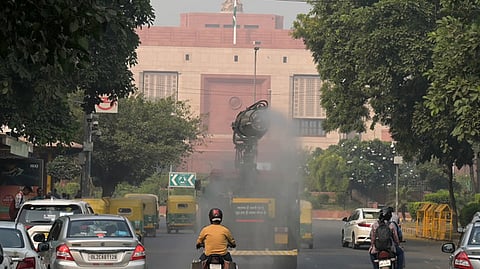

NEW DELHI: The Supreme Court on Friday in its order directed the Delhi government and Police to constitute checkpoints on all 113 entry points to Delhi to check the entry of trucks in the national capital, keeping in view the increasing level of pollution.
A two-judge bench of the apex court, led by Justice Abhay S Oka and Justice Augustine George Masih passed the order after it was apprised by the concerned authorities that there are 113 entry points and the vigil is maintained primarily at 13 major entry points.
The apex court was hearing the case relating to the pollution in Delhi-NCR and especially the plea filed by noted environmentalist, M C Mehta.
The bench fixed the matter for further hearing to November 25 whether the GRAP-IV restrictions should be continued.
The apex court appointed 13 members as court commissioners to visit the entry points at various places in Delhi and ensure that the entry of trucks is being stopped.
While expressing its serious displeasure and dissatisfaction with the compliance of GRAP IV measures, SC remarked that despite its passing of orders, there is failure on part of the Delhi government and Police to comply with GRAP stage IV.
“So far as complaince is concerned, we are not satisfied. Government has not stated clearly as to at how many entry points there are officers present to comply with measures of GRAP IV," it said.
GRAP (Graded Response Action Plan) is a set of measures aimed at combating air pollution in the national capital and surrounding areas, with restrictions imposed based on the severity of the air quality. GRAP III and IV are implemented when the air quality reaches severe levels.
Thr apex court added that its orders must be strictly applied with.
"We direct the Delhi Government and Delhi Police to ensure that checkposts are immediately set up at all 113 entry points," the bench ordered.
The apex court appointed 13 advocates as court commissioners to assist the court in ensuring its orders being implemented in stopping the trucks in entering Delhi. It asked the Additional Solicitor General (ASG) to forward their names to the Delhi Police Commissioner to facilitate their visit to the entry points and they can take photographs and file a report to the court.
The bench remarked, "Out of 113 entry points, nearly 100 are unmanned, meaning there is no one to check the entry of trucks. We requested members of the bar to monitor these points, We are happy to note that 13 young members of the Bar have volunteered to act as commissioner of this court."
After noting that there are CCTV cameras at 13 entry points, the apex court directed CCTV footage to be given to amicus curiae in the case at the earliest time ensue compliance of its order.
Earlier on November 18, the Supreme Court had directed that physical classes for all the school students up to grade 12 in Delh-NCR should be suspended for the time being and have to strictly implement GRAP stage IV anti-pollution measures as AQI (air quality index) remains in the "severe" category.
The bench also had directed Delhi-NCR states to immediately constitute teams for monitoring the actions that are required under it to keep a tab on the rising level of pollution and listed the matter for further hearing to November 22, when it would see as to whether it's orders have been complied with by the authorities or not.
"The constitutional obligation of the Central Government and the State Governments is to ensure that the citizens live in a pollution-free atmosphere. Therefore, in addition to the actions proposed under Stages III and IV of the GRAP, all possible actions shall be taken at the level of the State Governments to ensure that the AQI is brought down," the top court said in the order.
"The approach adopted by the Commission (Commission for Air Quality Management -CAQM) seems to be that it waited for AQI to improve and thus delaying implementation of stages 3 and 4 which is a wrong approach. The Commission cannot wait for the improvement of AQI," the Court, in its order on Monday, said.
It had asked the CAQM to consider stringent action under GRAP stage III and IV and that nothing is left to the discretion of the state or authorities. The apex court also expressed dissatisfaction with the CAQM for waiting for the AQI to breach the threshold to enforce the GRAP-III and GRAP-IV protocols.
The Bench observed these remarks after hearing the case concerning pollution in Delhi and specifically examining the action taken by authorities across Punjab, Haryana and Uttar Pradesh to curb stubble burning incidents.
"The approach adopted by the commission (CAQM) seems to be that they have decided to wait for improvement of AQI and therefore implementation of GRAP stage III and stage IV was delayed. This is completely a wrong approach. Even in anticipation of AQI decreasing the threshold limit it is the duty of the commission to start implementation of GRAP III or GRAP IV as the case maybe. The commission cannot wait for improvement of AQI," said the bench, which was dissatisfied the way the Delhi govt and CAQM and other respective agencies were trying to take the effective measures to control pollution.
The top court further directed all the NCR state governments and Centre to immediately take a call on steps on the formulation of a plan on controlling measures to curb air pollution and present them to the court before the next date of hearing.
It also directed Delhi and NCR governments to set up grievance redressal mechanism to report violations of the step.